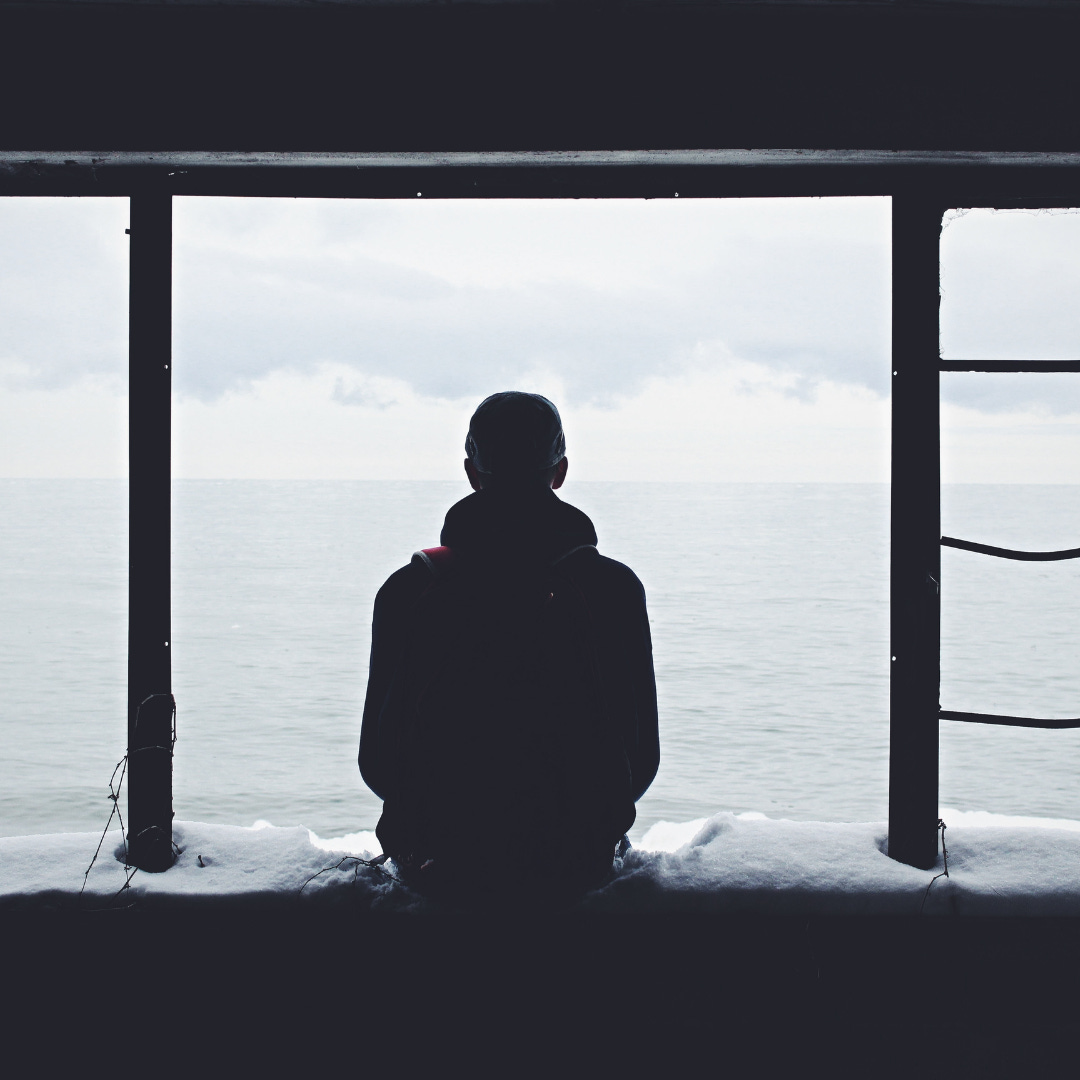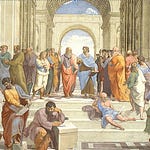Fellow Philosophers,
This letter is by far the most challenging but also by far it has been the most rewarding.
It’s also about twice as long as usual. This is awesome because there's so much to talk about, but not as awesome if you’re short on time. In case that’s your situation, I’ve read today’s episode as a podcast, and also included a short synopsis below. If you need to, take a few sessions to read this and check our IG account where we’ll be breaking it down over the weekend.
Every morning I write an email exploring life through the eyes of the world’s greatest thinkers. Sign up here if you would like to receive it directly in your inbox.
Synopsis: “According to the law of the conservation of energy, not a bit of you is gone; you're just less orderly. Amen.” —Aaron Freeman
That Synopsis seems easy enough, so now it’s time to show my work. It’s just some simple physics…said no one ever.
Besides, what does physics have to do with philosophy?
Well, as it turns out quite a bit. I remember how confused I was to learn that the physics department at my university was, until a recently, referred to as the “Department of Applied Philosophy.”
As it turns out, the framework that people like Aristotle and DaVinci laid out in combining the observations about the natural universe with deeper intangible thoughts about reality is a well-worn path that leads right up into the modern day.
As in any great story, this ancient tension has produced a pretty incredible history behind it, fraught with war, conquest, and a fight to own the way we all see the world.
This duality—that we’ll spend the rest of our time today unpacking—is the engine that has driven much of human exploration and research for the last few thousand years.
This is the tension that exists between the way things are, and the way they feel.
To put it another way, it’s the tension that exists between faith and reason.
Or, to put it another way, it’s the tension that exists between Plato and Aristotle, the Romans and the Greeks, the religious and the existential.
Like any good duality, this cognitive-dissonance is not negative. In fact, it is the very stored energy that propels our species forward into the future—the only way to get an object at rest into motion.
In modern times, this tension is most directly expressed in what many refer to as a “classical” view of the world (think Newton and apples), and a subatomic or quantum view of the world (think Einstein, atoms, and quarks).
Before we go much further, let’s be honest, I’m a philosopher, not an applied philosopher (i.e. physicist.) But what is life without a little risk?
Bur for real, this is going to test the boundary of my knowledge, but I can’t help it, it’s really fun out there. So before I go too far into it, let me make a big gesture in the direction of Neil deGrasse Tyson who can bottom shelf the most complicated ideas in an extremely approachable way. I’ve shared some of his work (as well as others) in the references below if you’re into that sort of thing. (Pro Tip, you can stream Astrophysics for people in a hurry for free on Spotify).
And let’s not forget, this week’s theme is death. So even with all of that set-up, what do applied philosophers think about dying?
Let’s go back to that tension between those who see the world with a classical lens, and those who see the world from the bottom up, through the eyes of subatomic particles.
The boundary of current scientific knowledge is actually found in the no-man’s-land between these two points. Mentioned earlier this week, it’s a study referred to as Quantum Gravity—how do we marry what we know about the subatomic world, and what we know about the macro world, because it’s counterintuitive and they don’t add up.
For example, think about something as ubiquitous as consciousness. Everyone has it.
But, where the f**k is consciousness? Have you ever thought about that? Where would you point if I asked you to show me your consciousness?
You might say, “I know I am sentient, and conscious, and it feels like it comes from my brain,” but actually there is no evidence of that.
Or, what about our observation that subatomic particles are, more often than not, in two places at once.
Did you know that? (I didn’t until this week, and then went into a small existential crisis). Quantum gravity—both in terms of the emerging math and now empirical observation—is proving to us that all of matter at the quantum level is often in at least two places at the same time. So much so that this math much more resembles statistics than it does calculus.
Let me reframe that, the atomic world is best understood through the idea of probability.
I hope this doesn’t break things down too quickly, but the world is actually a series of probabilistic reactions, in which multiple (seemingly mutually exclusive outcomes) are happening simultaneously. From what I gather, that’s modern physics.
But biologically our brains have evolved to 1) avoid danger 2) predict reward and 3) make predictions. This is where our classical view of the world comes from—things tend to operate like this, it feels like this when this happens, I can expect this outcome when I perform this action etc.
Physics has a way of destroying that sense most directly tied to our short term survival instinct.
While it often feels like we are unique and one of a kind, existing today and gone tomorrow, the 1st law of Thermodynamics proves to us that actually all of the matter in our self-contained universe cannot be created or destroyed, only transferred.
Therefore, the material that comprises you and me and trees and stars and your dog and the air, is the same material and matter that was around during the big bang.
Combine this with the laws of entropy—that systems always become more disordered over time—and with each transfer of energy our universe is slowly unravelling into deeper disorder, every time someone dies and is born.
Essentially, our universe is slowly breaking down ordered matter into continuously less-ordered energy.
This means that from the perspective of physics, you never die, we are all simply constantly reordered, life after life, into less ordered forms than before.
What’s more, it appears (at least for now) that our brains are less where consciousness originates, and more where it is processed in those pattern recognition habits evolution gave us. This predicting and organizing mind might be what folks in traditions like Buddhism, Stoicism, and Psychotherapy refer to as the “ego.”
Perhaps then, a generous hypothesis about death through the eyes of a physicist might go something like this:
We’re all made of the same matter (thermodynamics), constantly breaking down in increasing disorder (entropy) life after life. Matter is expressing itself and being processed as an emergent property (ego) in each being’s lifespan before it begins again.
In this way, it’s like life is living us, over and over again.
This is a very simplified version of what is becoming known as Quantum Consciousness.
This was a big one, and heavy, but also exhilarating and right on the boundary of our collective knowledge.
I’m going to leave you with a short poem of sorts I came across from a physicist answering the question: why you’d want a physicist to give your eulogy.
You want a physicist to speak at your funeral. You want the physicist to talk to your grieving family about the conservation of energy, so they will understand that your energy has not died. You want the physicist to remind your sobbing mother about the first law of thermodynamics; that no energy gets created in the universe, and none is destroyed. You want your mother to know that all your energy, every vibration, every Btu of heat, every wave of every particle that was her beloved child remains with her in this world. You want the physicist to tell your weeping father that amid energies of the cosmos, you gave as good as you got.
And at one point you'd hope that the physicist would step down from the pulpit and walk to your brokenhearted spouse there in the pew and tell him that all the photons that ever bounced off your face, all the particles whose paths were interrupted by your smile, by the touch of your hair, hundreds of trillions of particles, have raced off like children, their ways forever changed by you. And as your widow rocks in the arms of a loving family, may the physicist let her know that all the photons that bounced from you were gathered in the particle detectors that are her eyes, that those photons created within her constellations of electromagnetically charged neurons whose energy will go on forever.
And the physicist will remind the congregation of how much of all our energy is given off as heat. There may be a few fanning themselves with their programs as he says it. And he will tell them that the warmth that flowed through you in life is still here, still part of all that we are, even as we who mourn continue the heat of our own lives.
And you'll want the physicist to explain to those who loved you that they need not have faith; indeed, they should not have faith. Let them know that they can measure, that scientists have measured precisely the conservation of energy and found it accurate, verifiable and consistent across space and time. You can hope your family will examine the evidence and satisfy themselves that the science is sound and that they'll be comforted to know your energy's still around. According to the law of the conservation of energy, not a bit of you is gone; you're just less orderly. Amen.
Until Next Week,
-TPP
Podcast: Music by Timmoor from Pixabay
References:
Astrophysics for People In A Hurry, Neil deGrasse Tyson
https://www.forbes.com/sites/startswithabang/2019/03/15/this-is-why-the-multiverse-must-exist/?sh=6d304986d086
https://en.m.wikipedia.org/wiki/Orchestrated_objective_reduction















On Dying